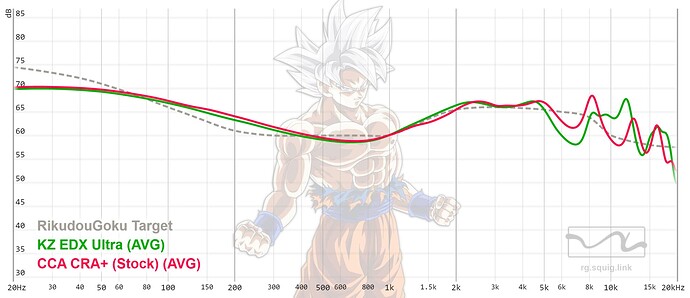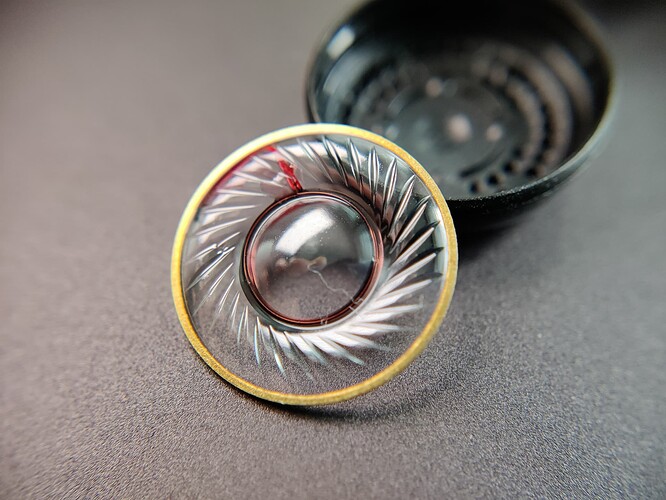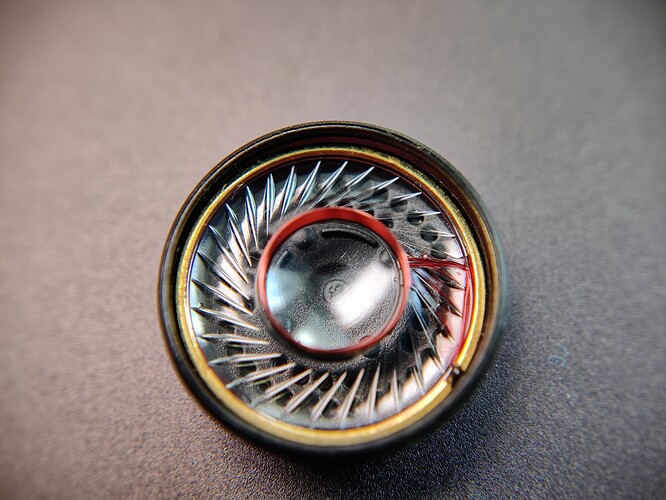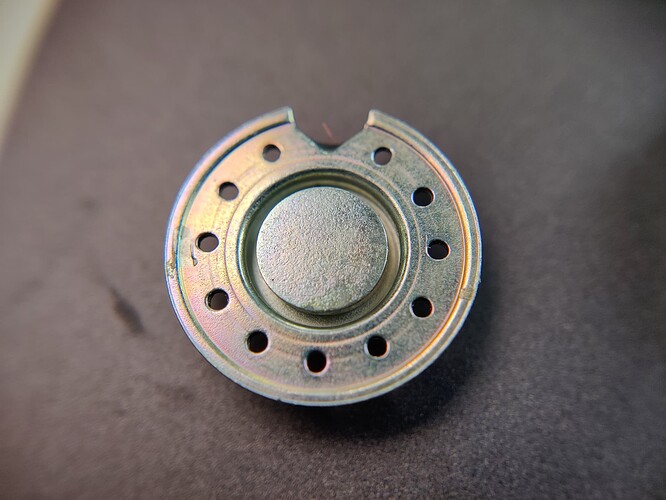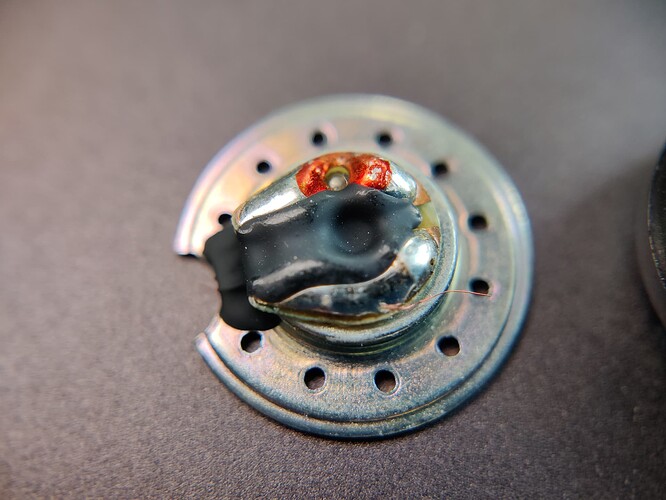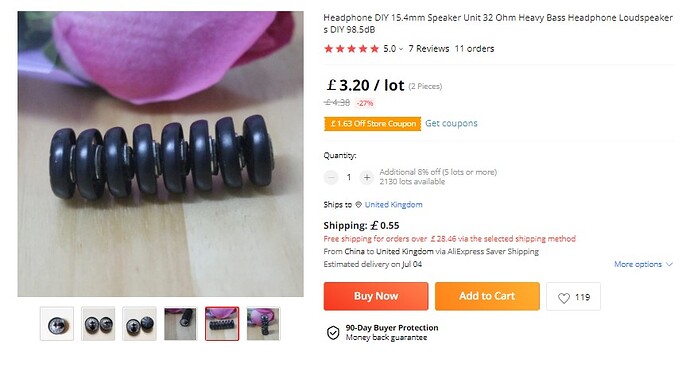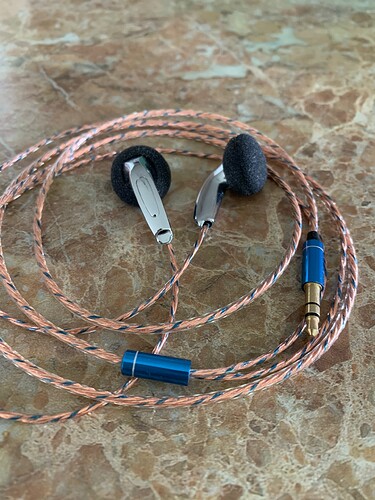Welcome to the rabbit hole. You know where to look at next. ![]()
He better sign up quick because that queue is ever growing!
They look a tad similar ![]()
yeah and one of them definitely didnt sound like I was expecting it to based on graphs.
I’ve heard good things about this KZ. and it’s newer … so I guess this is the better one ![]()
Ironically I dont know which one is newer. ![]()
how are they compared to CRA?
will review it after the VULKAN.
Dang that is a nice driver. For earbud? Is it beryllium?
yeah, its an earbud driver, the red dot specifically.
As you can see in the first pic, its just a plastic membrane. No metal coating.
Interesting. Always wondered if metal deposition actually impacts the driver performance…quite skeptical when manufacturers claim “beryllium” or “carbon nanotube” coated DDs, unless they actually have supporting evidence in the form of patents or reports (e.g., DUNU).
I dont like this one that much, the titanium composite version is a lot better. (Berserker 1 and Saber 1 driver.)
Different coatings will definitely have an effect. But as you say, when it comes to the more premium stuff like Beryllium or Graphene, the implementation is crucial and in most cases, they are probably half-assed.
Grand Rider 1 Condensed Review
So I’ve been listening to these bad boys (100 Euros) for the past 2 weeks or so, and I gotta admit: I love them. Due to work and life circumstances I don’t currently have the time to write a full essay for these, but I’ll condense my thoughts as best as I can.
Pros:
-
Amazing soundstage. Very natural and not due to any treble adjustments. Not 3D like the Tea, but more expansive; more depth to the stage like a wall of sound in front of you. I prefer the soundstage on the GR1 more than Olina, and a tie with the Tea depending on the song. For example, hiphop, pop, R&B, dance, EDM sounds better on the GR1; whereas Rock, Alternative, Vocals, Indie, and acoustic sounds better on the Tea due to its better imaging and separation.
-
Very full sounding and rich; no thinness in instruments or vocals. Lush and natural timbre. Definitely a set to crank up and immerse yourself in the music with. Warmer than Olina. Vocals are in-between forward and pushed back but still clear somehow in the midst of all the mid-bass. Smooth and non-fatiguing upper-mids and treble for high volume listening.
-
Booming bass. Awesome texture and rumble in the low end. I’d say it’s the best bass I’ve heard for under $600 (EJ07M), but note that I have not heard many bass-focused sets like the Serial; definitely better than the Hana, Olina, and Tea though. I also prefer the bass on the GR1 over the Timeless since it’s more full sounding vs the fast & lean bass from planars.
Cons:
-
Lack of treble extension. Although I love the GR1 for its low-end and mids, I do wish it had more treble. Treble decay is often way too fast on cymbal crashes and missing the splashes. This tuning means you can crank up the GR1 (the only pair that sounded amazing on All Too Well by Taylor Swift), but at the same time means you’re missing small details of the music in the higher frequencies on other songs. It’s darker than the OG Tea; a little more would’ve been perfect for me.
-
Average imaging and separation combined with mid-bass/low-end emphasis results in a lower-definition experience (lack of treble extension doesn’t help either) with softer presentation. If the Z1R/U12T is 4K, and the Olina/Tea is around 1440P, then the GR1 would be close to 1080P. This is still good (around Starfield level), but just don’t expect amazing clarity and technicalities.
BUT, even with the drawbacks in technicalities the GR1 is still amazing and is my go-to when I’m working or just want to relax after a long day and feel the music. It’s the most comfortable (although the fit angle needs some time to get used to), and really allows me to immerse myself like the OG Teas. When I’m feeling hiphop, POP, dance, EDM, or R&B I’d grab the GR1s, whereas when I want to immerse myself in vocals or pick out the instruments and feel the precisions of the mixes I’d pop in the Teas. The GR1s are a complementary set next to the Teas; this used to be the Olinas, but I prefer the warmer, and fuller sounding signature of the GR1 better for those genres mentioned above. Sorry Chris!
Grand Rider 1 Ranking: A-
https://docs.google.com/spreadsheets/d/1dndFGgeDaRB1gxdnbHu3U7xXgBeSNI5xU30iJZXH07A/edit?usp=sharing
Possible improvements:
–Slightly more treble extension (or slightly less mid-bass or both w/e works better)
–Additional drivers (like BAs) to take care of imaging and separation
But all in all, amazing work @Rikudou_Goku! Love it ![]() Also, thanks for the fast shipping
Also, thanks for the fast shipping ![]()
AFAIK Early treble roll off is the trade off with a lot of beryllium drivers. I think if there was a diaphram designed specific to beryllium coating it could be better. You could try EQing up the treble region up because it may still be nicely textured.
Do you have any tips on how to EQ earbuds? I’m still new to them so just wondering if the EQ is similar as IEMs?
I have only EQ’d my IEMs for now just to play around and see what can do, so no real tips here, besides trial and error. Comparatively, the Grand Rider 1 graph looks way better than the graph of DIY Qigom S130 that I think uses the same driver so they are definitely tuned well. If I were to hazard a guess, you could bring up 1.5 KHz and 3.7 KHz (or 4KHz) up a few DB, maybe 10KHz as well, but YMMV.
IDK. Probably start with around 10KHz to 11 KHz up a couple dB until you get the sheen you are after.
